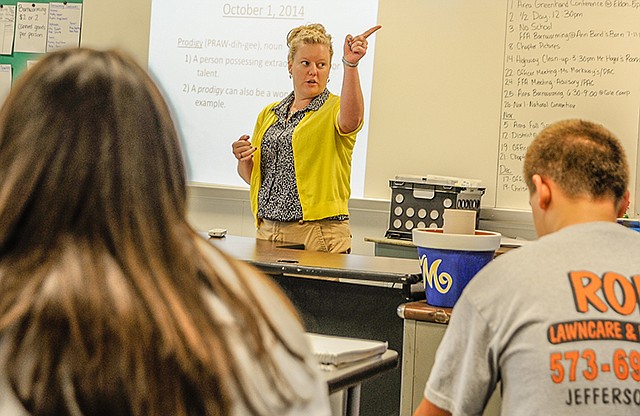EUGENE - Students at Eugene High School now have the option of earning dual credit in two agriculture classes.
Agriculture instructor Bethany Markway is in her first year of teaching agriculture at her alma mater, across the hall from her high school FFA adviser Ed Hager.
Markway serves as an example of the dual credit system. She graduated in four years with a bachelor's degree in general agriculture and a master's degree in natural and applied sciences from Missouri State University, Springfield. That was possible because she carried nearly a year's worth of credits with her from Eugene.
"I knew I wanted to be an ag teacher, and I came out with what I wanted," she said.
Now, she's teaching agriculture business and animal science as dual credit classes through Missouri State.
"It's a neat program for upperclassmen," Markway said. "We hope they are all going to get agriculture degrees or at least invest in the agriculture industry."
The Eugene FFA/ag program experienced more change than the addition of Markway and the dual credit classes.
The program also absorbed the industrial arts space and responsibilities with the retirement of Greg Geritz after 31 years. FFA students now have access to both the metalwork and woodwork sides of the shop, built 14 years ago. The ag structures I and II classes, as well as others, will add industrial arts skills into the curriculum.
Hager said he hopes some FFA members might have woodworking projects to enter in spring competitions, something else new this year.
The hands-on learning and problem-solving approach in the ag classes also benefits the core curriculum classes, Markway said.
"We push problem-based learning - reading, writing, English, we do every day - and math is big, we learn to ration feed and how to measure in the wood shop," Markway said. "We offer a practical approach to what they are learning in other subject areas."
The Eugene FFA chapter has about 140 members, which is roughly 60 percent of the student body.
Most students join their freshmen year to be part of fun activities and then get involved with the leadership and learning projects.
Members are not always from farm families.
"They still eat lunch and wear clothes," Markway said. "We provide life skills as well as agriculture skills. My theory is everybody eats, and everybody needs to use a hammer once in their life."
Even students who have grown up on a farm benefit from conversations that define information that might have been "implied knowledge" from familiarity.
"At school, we may make connections in a different way," Markway said.
In addition to technology and hands-on projects, the ag classes invite speakers from the business world to share real-world problems and experiences.
Markway grew up on a dairy farm, near Mary's Home. And her fiance farms near Jefferson City.
So, returning to Mid-Missouri was in her plan all along. Returning to teach at her alma mater, with her former FFA adviser - that's just a bonus.
"The ag program made a difference in my life in high school," Markway said. "I've had the opportunity to travel at local, state and national levels. That impacted how I see the world.
"This is my way to give back."

